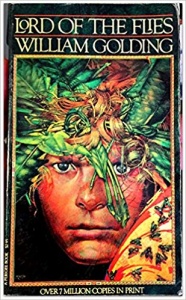William Golding’s Lord of the Flies
Listen to the Recess! Clip
| Author | John Cech |
| Air Date | 9/19/2000 |

William Golding Transcript
Almost fifty years before “Survivor,” William Golding’s disturbing Lord of the Flies was published in 1954. It was much more reality-based and therefore much scarier than anything the networks might later fabricate for us. The novel was about what could happen when people, in this case, children, were set free from the need to adhere to codes of ethics and morality, when they were free to act on their own Id-fueled impulses. It was Golding’s first novel and, even though he went on to write over a dozen others, this book about a group of boys marooned on a deserted island, while their adult counterparts are fighting in the skies above them, was largely responsible for his winning the Nobel Prize for Literature in 1983.
Golding was born in Cornwall, England, on September 19 in 1911. Though his father wanted him to be a scientists, Golding studied literature at Oxford. After World War II, in which he served in the navy and was involved in the sinking of the Bismark and the Normandy invasion, Golding became a teacher like his father, in a public school, where the 12-year old boys that he taught promptly gave him the nickname “Scruff” because of his unruly hair and beard.
Years later, his students remember the unusual respect that Golding showed his young charges, whom he was probably observing for what would later become his novel about young people. But the moving force for Lord of the Flies came, Golding told an NPR interviewer in 1985, from, in Golding’s words, “just sheer grief. We’d found out about the human condition and it was just sheer grief at having gone through the war and to know that the war had been an event but it hadn’t settled much.”
In fact. Golding’s experience of the war, and his reflections about it afterward left him with the unsettling recognition that the “good guys” who had won the war now needed to turn their attentions to their own shadows – to the capacity for evil and cruelty that each of us (child or adult) has within us. We needed to be reminded, Golding believed, of that heart of darkness that beats not far beneath the civilized surfaces of our lives – precisely because, paradoxically, Golding also believed, as he said in his Nobel acceptance speech, that “we are the children of that great blue white jewel… we are part of the solar system and part through that of the whole universe. In the blazing poetry of [that] fact we are children of the stars.”